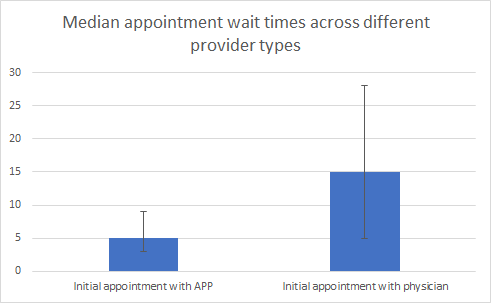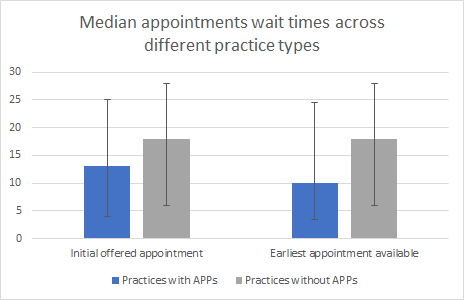Back
Poster, Podium & Video Sessions
Moderated Poster
MP13: Health Services Research: Practice Patterns, Quality of Life and Shared Decision Making I
MP13-08: Advanced Practice Providers and Wait Times in Urology Practices: A Secret Shopper study
Friday, May 13, 2022
2:45 PM – 4:00 PM
Location: Room 228
Armaan Singh*, Jared Lassner, Marc Sleiman, Parth Modi, CHICAGO, IL
- AS
Armaan Singh, BA
Pritzker School of Medicine
Poster Presenter(s)
Introduction: Advanced practice providers (APPs), such as nurse practitioners and physician assistants, are a growing part of urology practices. However, the impact of APPs on improving new patient access in urology is unknown. We examined the impact of APPs on new patient wait times in a real-world sample of urology practices.
Methods: We conducted a “secret shopper” study in which researchers posing as caretakers called urologic practices in the Chicago area to schedule an appointment for an elderly grandfather with gross hematuria. Practices within a 50-mile radius of Chicago, IL were identified using the Urology Care Foundations “Find-a-urologist” search engine. For each practice, we recorded the number of days until the first offered appointment, the type of provider that was offered, the availability of an alternative provider, and potential wait time for that alternative visit.
Results: Of the 86 practices with which we scheduled appointments, 55 (64%) employed at least one APP. Practices with APPs offered earlier initial appointments than did practices without APPs (Figure 1; 13 days vs 18 days; P=0.17). When requested for the earliest appointment regardless of provider type, practices with APPs could offer even shorter wait times compared to physician-only practices (Figure 1; 10 vs 18 days; P=0.08). Initial appointments with an APP were available with a significantly shorter wait than those with a physician (Figure 2; 5 days vs 15 days; P=0.04).
Conclusions: Our study suggests that APP employment is associated with shorter wait times for new patient visits. However, while most practices employ APPs, only a small proportion of these offered initial new patient visits with an APP. Further work is needed to better elucidate the role of APPs in these practices and how best they might be deployed.
Source of Funding: none


Methods: We conducted a “secret shopper” study in which researchers posing as caretakers called urologic practices in the Chicago area to schedule an appointment for an elderly grandfather with gross hematuria. Practices within a 50-mile radius of Chicago, IL were identified using the Urology Care Foundations “Find-a-urologist” search engine. For each practice, we recorded the number of days until the first offered appointment, the type of provider that was offered, the availability of an alternative provider, and potential wait time for that alternative visit.
Results: Of the 86 practices with which we scheduled appointments, 55 (64%) employed at least one APP. Practices with APPs offered earlier initial appointments than did practices without APPs (Figure 1; 13 days vs 18 days; P=0.17). When requested for the earliest appointment regardless of provider type, practices with APPs could offer even shorter wait times compared to physician-only practices (Figure 1; 10 vs 18 days; P=0.08). Initial appointments with an APP were available with a significantly shorter wait than those with a physician (Figure 2; 5 days vs 15 days; P=0.04).
Conclusions: Our study suggests that APP employment is associated with shorter wait times for new patient visits. However, while most practices employ APPs, only a small proportion of these offered initial new patient visits with an APP. Further work is needed to better elucidate the role of APPs in these practices and how best they might be deployed.
Source of Funding: none



.jpg)
.jpg)